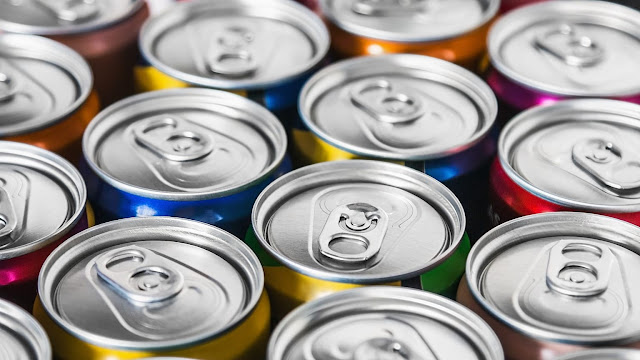On September 3, 2025, the UK government announced a groundbreaking proposal to ban the sale of high-caffeine energy drinks to children under 16 in England, a move aimed at addressing the growing public health crisis of childhood obesity, as well as related issues such as anxiety, disrupted sleep, and poor academic performance. The initiative, spearheaded by Health and Social Care Secretary Wes Streeting, reflects a broader shift in UK public health policy toward prevention rather than treatment. This article explores the details of the proposed ban, its rationale, the scientific evidence supporting it, stakeholder reactions, and its potential impact on public health, education, and the beverage industry. By delving into the historical context, current challenges, and global comparisons, we aim to provide a thorough understanding of this significant policy proposal.
The Announcement and Its Core Objectives
The UK government’s plan, as outlined in multiple reports, seeks to prohibit the sale of energy drinks containing more than 150 milligrams of caffeine per liter to individuals under 16 across all retail settings, including shops, restaurants, cafes, vending machines, and online platforms. Popular brands such as Red Bull, Monster, Relentless, and Prime Energy would fall under this restriction, while lower-caffeine beverages like Coca-Cola, Diet Coke, Pepsi, and tea and coffee would remain unaffected. The policy, which requires parliamentary approval, is currently in a 12-week consultation period ending on November 26, 2025, to gather input from health experts, educators, retailers, manufacturers, and the public.
The primary objectives of the ban are multifaceted. First, it aims to reduce childhood obesity, with ministers estimating that the policy could prevent obesity in up to 40,000 children and yield health benefits worth tens of millions of pounds. Second, it seeks to address the negative effects of high-caffeine energy drinks on children’s mental and physical health, including disrupted sleep, increased anxiety, poor concentration, and dental issues. Third, the policy is intended to improve educational outcomes by mitigating the impact of these drinks on classroom behavior and academic performance. Health Secretary Wes Streeting emphasized the urgency of the issue, stating that energy drinks, which can contain the caffeine equivalent of a double espresso, have no place in the hands of children, as they undermine their well-being and ability to succeed in school.
This initiative fulfills a pledge made by the Labour Party in its manifesto for the 2024 general election, reviving a proposal that was initially introduced in 2018 but abandoned in 2019 under then-Health Secretary Sajid Javid, who criticized it as an example of “nanny state” overreach. The renewed effort reflects growing concerns about the accessibility of energy drinks to children and the lack of consistent regulation across retail settings, particularly in smaller convenience stores and vending machines.
The Public Health Crisis: Childhood Obesity and Energy Drinks
Childhood obesity is a pressing public health issue in the UK, with significant implications for both individual well-being and the National Health Service (NHS). According to the Department of Health and Social Care, approximately one in three children in the UK is overweight or obese by the time they leave primary school, with children from deprived communities at twice the risk. Obesity is linked to a range of health problems, including type 2 diabetes, heart disease, certain cancers, liver disease, and osteoarthritis, and it costs the NHS an estimated £6.5 billion annually. The high sugar content in many energy drinks, some of which contain up to 21 teaspoons of sugar per serving, exacerbates this crisis by contributing to excessive calorie intake and dental decay.
Beyond obesity, high-caffeine energy drinks pose additional risks to children’s health. Research indicates that approximately 100,000 children in the UK consume at least one energy drink daily, with up to one in three 13- to 16-year-olds consuming them weekly. A 250ml can of a typical energy drink contains around 80mg of caffeine, equivalent to a cup of coffee, while larger cans can deliver 160–200mg, comparable to two cups. A review of 57 studies published in the journal Public Health in 2024 found a strong association between energy drink consumption and adverse outcomes in children, including short sleep duration, poor sleep quality, low academic performance, psychological distress, and even increased risk of suicide and substance use. These findings underscore the need for intervention, particularly given the vulnerability of young people to the effects of caffeine and sugar on their developing bodies and minds.
Dr. Kawther Hashem, head of research and impact at Action on Sugar, Queen Mary University of London, described energy drinks as “unnecessary” and “harmful,” arguing that they should never have been so easily accessible to children. She highlighted the dual threat of free sugars, which increase the risk of obesity, type 2 diabetes, and tooth decay, and high caffeine content, which can harm mental health and well-being. Similarly, Professor Tracy Daszkiewicz, president of the Faculty of Public Health, emphasized that children from deprived communities, who are already at higher risk of obesity, are particularly affected by the widespread availability of these drinks.
Historical Context: Previous Efforts and Global Precedents
The UK’s proposed ban is not the first attempt to regulate energy drink sales to children. In 2018, the government under then-Health Secretary Jeremy Hunt launched a consultation to ban the sale of energy drinks to under-16s as part of a broader strategy to halve childhood obesity by 2030. The plan included measures such as calorie labeling on menus, restrictions on advertising unhealthy foods, and promoting physical activity in schools. Despite widespread public support—approximately 90% of the population favored the ban—the proposal was shelved in 2019 by Sajid Javid, who argued that voluntary restrictions by major retailers were sufficient.
Indeed, major supermarkets such as Tesco, Sainsbury’s, Waitrose, Morrisons, and Asda have implemented voluntary bans on selling high-caffeine energy drinks to under-16s since 2018. However, research suggests that smaller convenience stores and vending machines often lack such restrictions, allowing children easy access to these products. This inconsistency has fueled calls for a legally enforced ban to create a level playing field across all retail settings and ensure comprehensive protection for young people.
The UK is not alone in addressing this issue. Several European countries, including Latvia, Lithuania, and Poland, have implemented bans on energy drink sales to minors. Poland, for instance, introduced a ban on sales to under-18s in 2025, citing similar concerns about health and behavior. These international examples provide a precedent for the UK’s proposed policy and demonstrate the feasibility of age-based restrictions in reducing children’s access to harmful products. The success of similar measures in restricting alcohol and tobacco sales to minors, as noted by Katharine Jenner, director of the Obesity Health Alliance, suggests that such policies can be effective when properly enforced.
Stakeholder Perspectives: Support and Criticism
The proposed ban has garnered widespread support from health experts, educators, and public health organizations, who view it as a critical step toward protecting children’s health and improving educational outcomes. Katharine Jenner praised the policy as a “common-sense, evidence-based step” to safeguard children’s physical, mental, and dental health, emphasizing the proven effectiveness of age-of-sale restrictions. Teachers, represented by figures like Bridget Phillipson, the education secretary, have highlighted the impact of energy drinks on classroom behavior, with reports of students “bouncing off the walls” after consuming them on their way to school. A survey by the NASUWT union found that 71% of teachers are concerned about pupils misusing energy drinks at school, with 70% noting similar issues outside the classroom.
Health organizations such as Action on Sugar, the Obesity Health Alliance, the British Dental Association, and the Royal College of Paediatrics and Child Health have been vocal advocates for the ban. British Dental Association Chair Eddie Crouch described energy drinks as “habit-forming” and “highly acidic,” noting their contribution to a “toxic food environment” for children. Amelia Lake, a professor of public health nutrition at Teesside University, cited global evidence showing the detrimental effects of energy drinks on children’s mental and physical health, arguing that they “have no place in the diets of children.”
However, the proposal has not been without criticism. The British Soft Drinks Association (BSDA), represented by Director General Gavin Partington, argues that its members have already taken significant steps to self-regulate. Since 2010, the BSDA has maintained a voluntary code of practice that prohibits marketing or promoting energy drinks to under-16s and requires high-caffeine beverages to carry warning labels stating they are “not recommended for children.” Partington emphasized that major manufacturers comply with this code and urged the government to base any regulation on a rigorous assessment of evidence. Some industry stakeholders have expressed concerns about the economic impact of the ban, with an estimated £100.5 million decrease in retailer profits and £658.9 million in losses for energy drink manufacturers over a 25-year period, alongside costs for age verification and staff training.
Young people themselves have offered mixed perspectives. While some, like Year 9 pupil Lewis in a 2022 Welsh consultation, view bans as “a bit extreme” and suggest alternatives like better product placement or education, others, like his classmate Kundi, acknowledge the need to inform young people about the health risks of energy drinks. These views highlight the importance of combining regulatory measures with educational campaigns to address both access and awareness.
Scientific Evidence and Policy Implications
The scientific rationale for the ban is grounded in extensive research linking energy drink consumption to adverse health and behavioral outcomes. The high caffeine content in these drinks—often exceeding 150mg per liter—can overstimulate the nervous system, leading to increased anxiety, poor sleep quality, and reduced concentration. For children, whose bodies and brains are still developing, these effects are particularly pronounced. A 250ml can of Red Bull, for example, contains 115 calories and 80mg of caffeine, while a 330ml can of Prime Energy contains only 10 calories but still delivers significant caffeine. The high sugar content in many energy drinks further exacerbates health risks, contributing to obesity, type 2 diabetes, and tooth decay.
Tom Sanders, an emeritus professor of nutrition and dietetics at King’s College London, has questioned the claim that the ban will prevent obesity in 40,000 children, arguing that caffeine itself does not promote weight gain and that the term “high-energy drinks” is often confused with high-calorie drinks. While Sanders acknowledges the need to restrict caffeine intake in young people, he suggests that the obesity reduction estimates may be overstated. This critique underscores the complexity of addressing obesity, which is influenced by multiple factors, including diet, physical activity, and socioeconomic conditions.
The government’s economic review of the ban projects significant health benefits, including reduced calorie intake and prevention of obesity-related conditions over children’s lifetimes. These benefits are expected to offset economic losses in the beverage industry, as gains in the carbonated soft drink market could compensate for declines in energy drink sales. The review also highlights the importance of enforcement, with Dr. Kawther Hashem stressing that the policy’s success will depend on closing loopholes, such as unregulated sales in convenience stores and vending machines.
Broader Implications for Public Health and Education
The proposed ban is part of a broader shift in UK public health policy toward prevention, as articulated by Wes Streeting. By addressing the root causes of poor health and educational attainment, the government aims to create “healthier and happier generations.” This approach aligns with other initiatives, such as calorie labeling on menus, restrictions on junk food advertising, and programs like Healthy Start, which support families in accessing nutritious food. The ban also addresses health inequalities, as children from deprived communities are more likely to consume energy drinks and face higher risks of obesity and related health issues.
In the education sector, the policy is expected to improve classroom behavior and academic performance. Teachers have reported that energy drinks contribute to hyperactivity and lack of focus, with some students consuming them daily as a substitute for proper nutrition. Education Secretary Bridget Phillipson described the ban as a step toward tackling the “scourge of poor classroom behavior,” which she attributes in part to the harmful effects of caffeine-loaded drinks. By reducing children’s access to these products, the government hopes to create a more conducive learning environment and support long-term educational outcomes.
Global Comparisons and Future Directions
The UK’s proposed ban draws inspiration from similar policies in other countries, such as Latvia, Lithuania, and Poland, which have successfully restricted energy drink sales to minors. These examples suggest that age-based restrictions can reduce consumption and mitigate health risks, particularly when combined with robust enforcement and public awareness campaigns. In Wales, a 2022 consultation explored similar measures, including banning energy drink sales to under-16s and restricting takeaway openings near schools, reflecting a regional commitment to tackling childhood obesity.
Looking ahead, the success of the UK’s policy will depend on several factors. First, effective enforcement will be critical to ensure compliance across all retail settings, including small shops and online platforms. Second, public education campaigns will be essential to raise awareness about the risks of energy drinks and promote healthier alternatives. Third, the government must address broader determinants of obesity, such as access to nutritious food, physical activity opportunities, and socioeconomic disparities. The 12-week consultation period provides an opportunity to refine the policy based on stakeholder input and ensure its alignment with scientific evidence and public needs.
Conclusion
The UK government’s proposed ban on the sale of high-caffeine energy drinks to under-16s represents a bold and evidence-based step toward addressing childhood obesity, improving mental and physical health, and enhancing educational outcomes. By targeting drinks like Red Bull, Monster, and Prime Energy, the policy aims to reduce children’s exposure to harmful levels of caffeine and sugar, which contribute to a range of health and behavioral issues. Supported by health experts, educators, and public health organizations, the ban reflects a growing recognition of the need to protect young people from the “toxic food environment” described by advocates like Eddie Crouch.
While the policy faces some criticism from industry stakeholders and requires careful enforcement to succeed, its potential to prevent obesity in up to 40,000 children and deliver significant health benefits makes it a landmark initiative. As the UK moves toward a prevention-focused public health strategy, the ban serves as a model for other nations grappling with similar challenges. By combining regulation, education, and broader health initiatives, the government can create a healthier future for its youngest citizens, ensuring they have the opportunity to thrive both in school and in life.







